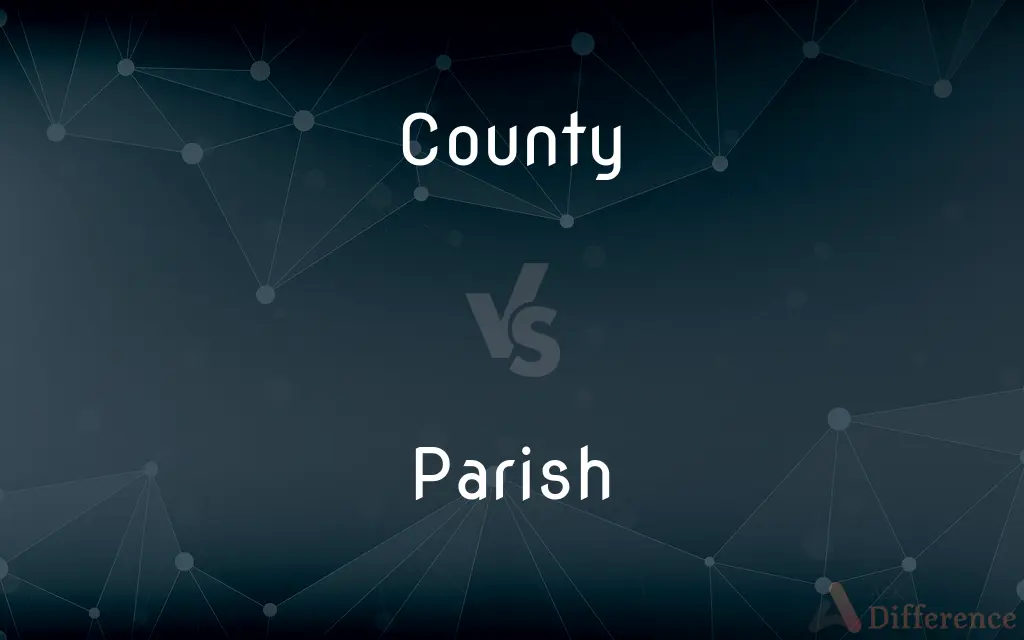County vs. Parish — What's the Difference?
By Tayyaba Rehman — Updated on October 23, 2023
A county is a territorial division for administrative purposes, while a parish can be a similar administrative region or a religious district, particularly in Louisiana or the Church of England.

Difference Between County and Parish
Table of Contents
ADVERTISEMENT
Key Differences
Both county and parish denote divisions of territory, but they are applied in different contexts and regions. A county, in most U.S. states, is a geographical and administrative division that exists beneath the state level. Parishes, on the other hand, are what these divisions are called in Louisiana, and they're the equivalent of counties elsewhere.
While the term "county" is widely understood and applied in many countries, the term "parish" also has a significant religious connotation. In ecclesiastical contexts, especially within the Church of England, a parish denotes a local church community or the territory of a particular church.
One can view a county as a secular term, having origins in governmental structures. Historically, counties have been established to help decentralize administrative responsibilities from central governments. Parishes, in contrast, have religious roots, especially in Europe, where they referred to territories under the pastoral care of a priest.
Despite the religious undertones of "parish," Louisiana uses this term in a purely administrative sense, devoid of religious associations. So, while in most of the U.S., one might discuss county laws or county officials, in Louisiana, it would be parish laws and parish officials.
To sum up, while both county and parish can refer to territorial and administrative divisions, their usage and associations differ significantly, with the former being primarily secular and widespread and the latter having both religious and regional applications.
ADVERTISEMENT
Comparison Chart
Basic Definition
A territorial division for administrative purposes.
An administrative or religious district.
Primary Usage
Administrative division under a state (U.S. general).
Louisiana's version of a county; Church of England's ecclesiastical district.
Origins
Secular, related to governance.
Both religious (European context) and administrative (Louisiana).
Scope
Found in many countries globally.
Specific to Louisiana or ecclesiastical contexts.
Associated Roles
County officials, county laws.
Parish officials (LA), parish priest (religious context).
Compare with Definitions
County
A geographical region marked for administrative purposes.
She is the county recorder responsible for maintaining records.
Parish
An ecclesiastical district with its own church and clergyman.
The parish community gathered for the Sunday service.
County
A district or territory with its own local authority.
The county has imposed new property taxes.
Parish
The local church community or the territory it serves.
He was well-respected within his parish.
County
An administrative division of a state or country.
The county fair is a popular event every summer.
Parish
A civil administrative district in some countries, similar to a county.
The parish council will meet next week to discuss the budget.
County
A subdivision of a state, often having its own government system.
This county has a reputation for its excellent school district.
Parish
A territorial division in Louisiana equivalent to a county.
They live in the most populous parish in Louisiana.
County
A county is a geographical region of a country used for administrative or other purposes in certain modern nations. The term is derived from the Old French conté or cunté denoting a jurisdiction under the sovereignty of a count (earl) or a viscount.
Parish
An area under the pastoral care of a particular church.
The parish priest has been serving the community for decades.
County
The largest administrative division of most states in the United States.
Parish
A parish is a territorial entity in many Christian denominations, constituting a division within a diocese. A parish is under the pastoral care and clerical jurisdiction of a priest, often termed a parish priest, who might be assisted by one or more curates, and who operates from a parish church.
County
A territorial division exercising administrative, judicial, and political functions in Great Britain and Ireland.
Parish
An administrative part of a diocese, especially an Anglican or Roman Catholic diocese, having its own church and a designated priest.
County
The territory under the jurisdiction of a count or earl.
Parish
The members of such a parish; a religious community attending one church.
County
The people living in a county.
Parish
A political subdivision of a British county, usually corresponding in boundaries to an original ecclesiastical parish.
County
An administrative region of various countries, including Bhutan, Canada, China, Croatia, Ireland, Japan, New Zealand, Norway, Poland, Romania, South Korea, Sweden, the United Kingdom, and 48 of the 50 United States (excluding Alaska and Louisiana).
Parish
An administrative subdivision in Louisiana that corresponds to a county in other US states.
County
A definitive geographic region, without direct administrative functions.
Traditional county
Parish
In the Anglican, Eastern Orthodox, Lutheran and Roman Catholic Church, an administrative part of a diocese that has its own church.
County
A jail operated by a county government.
He can't come; he's up in the county for agg assault.
Parish
The community attending that church; the members of the parish.
County
(historical) The land ruled by a count or a countess.
Parish
(US) An ecclesiastical society, usually not bounded by territorial limits, but composed of those persons who choose to unite under the charge of a particular priest, clergyman, or minister; also, loosely, the territory in which the members of a congregation live.
County
Characteristic of a ‘county family’; representative of the gentry or aristocracy of a county.
Parish
A civil subdivision of a British county, often corresponding to an earlier ecclesiastical parish.
County
An earldom; the domain of a count or earl.
Parish
In some countries, an administrative subdivision of an area.
County
A circuit or particular portion of a state or kingdom, separated from the rest of the territory, for certain purposes in the administration of justice and public affairs; - called also a shire. See Shire.
Every county, every town, every family, was in agitation.
Parish
An administrative subdivision in the U.S. state of Louisiana that is equivalent to a county in other U.S. states.
County
A count; an earl or lord.
Parish
(transitive) To place (an area, or rarely a person) into one or more parishes.
County
A region created by territorial division for the purpose of local government;
The county has a population of 12,345 people
Parish
(intransitive) To visit residents of a parish.
County
The largest administrative district within a state;
The county plans to build a new road
Parish
That circuit of ground committed to the charge of one parson or vicar, or other minister having cure of souls therein.
County
A region defined for local governance or jurisdiction.
He was elected as the county sheriff last year.
Parish
An ecclesiastical society, usually not bounded by territorial limits, but composed of those persons who choose to unite under the charge of a particular priest, clergyman, or minister; also, loosely, the territory in which the members of a congregation live.
Parish
In Louisiana, a civil division corresponding to a county in other States.
Parish
Of or pertaining to a parish; parochial; as, a parish church; parish records; a parish priest; maintained by the parish; as, parish poor.
Parish
A local church community
Parish
The local subdivision of a diocese committed to one pastor
Common Curiosities
Are "county" and "parish" the same in Louisiana?
Yes, in Louisiana, "parish" is the term used for what is called "county" in other U.S. states.
Do all U.S. states use the term "county"?
All U.S. states use "county" except for Louisiana, which uses "parish."
Do parishes exist outside the U.S.?
Yes, especially in religious contexts, like within the Church of England.
Which is larger: a county or a parish?
Neither is inherently larger; a parish in Louisiana functions equivalently to a county in other states.
Can a city span multiple counties or parishes?
Yes, some cities can span across multiple counties or parishes.
Why does Louisiana use "parish" instead of "county"?
The term reflects Louisiana's French and Catholic heritage.
How do county laws differ from state laws?
County laws are localized and specific to that county, whereas state laws apply to the entire state.
Is a parish always religious?
While "parish" has religious origins, in places like Louisiana, it's a secular administrative term.
Are county and parish officials elected by the residents?
Typically, yes. Both county and parish officials are usually elected by local residents.
Are there churches in every religious parish?
Typically, yes. A religious parish is often centered around a church.
Who governs a county?
Typically, a county is governed by a county commission or board of supervisors.
How is a parish's boundary determined in a religious context?
In a religious context, a parish's boundary is often determined by the local diocese or church authority.
Is there a difference between a parish priest and a regular priest?
A parish priest specifically serves a parish community, whereas a "regular" priest might have other duties or assignments.
How old are the concepts of counties and parishes?
Both concepts have medieval origins, with counties being more secular and parishes often ecclesiastical.
Can the boundaries of counties or parishes change?
Yes, boundaries can change, but it requires legal processes and often community input.
Share Your Discovery

Previous Comparison
Confirm vs. Affirm
Next Comparison
Cape vs. BayAuthor Spotlight
Written by
Tayyaba RehmanTayyaba Rehman is a distinguished writer, currently serving as a primary contributor to askdifference.com. As a researcher in semantics and etymology, Tayyaba's passion for the complexity of languages and their distinctions has found a perfect home on the platform. Tayyaba delves into the intricacies of language, distinguishing between commonly confused words and phrases, thereby providing clarity for readers worldwide.
















































